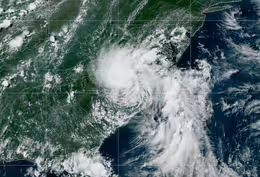
Study warns 1.5-degree warming limit too high for glaciers
Clip: 7/6/2025 | 4m 53sVideo has Closed Captions
Study warns 1.5-degree warming limit can’t prevent dangers of melting glaciers
The 2015 Paris agreement’s goal of limiting global warming to 1.5 degrees Celsius was thought to be the threshold for averting severe climate change impacts. But new research says even that level is too high to prevent the catastrophic consequences of sea level rise due to melting glaciers. John Yang speaks with Chris Stokes, one of the study’s authors, to learn more.
Problems playing video? | Closed Captioning Feedback
Problems playing video? | Closed Captioning Feedback
Major corporate funding for the PBS News Hour is provided by BDO, BNSF, Consumer Cellular, American Cruise Lines, and Raymond James. Funding for the PBS NewsHour Weekend is provided by...

Study warns 1.5-degree warming limit too high for glaciers
Clip: 7/6/2025 | 4m 53sVideo has Closed Captions
The 2015 Paris agreement’s goal of limiting global warming to 1.5 degrees Celsius was thought to be the threshold for averting severe climate change impacts. But new research says even that level is too high to prevent the catastrophic consequences of sea level rise due to melting glaciers. John Yang speaks with Chris Stokes, one of the study’s authors, to learn more.
Problems playing video? | Closed Captioning Feedback
How to Watch PBS News Hour
PBS News Hour is available to stream on pbs.org and the free PBS App, available on iPhone, Apple TV, Android TV, Android smartphones, Amazon Fire TV, Amazon Fire Tablet, Roku, Samsung Smart TV, and Vizio.
Providing Support for PBS.org
Learn Moreabout PBS online sponsorshipJOHN YANG: The 2015 Paris Agreement on climate change set the goal of limiting global warming by the end of the century to 1.5 degrees Celsius, which is 2.7 degrees Fahrenheit above what it was before the industrial age.
That was thought to be the threshold for averting severe climate change impacts.
But now new research published in the journal Communications Earth and Environment says that even that level is too high to prevent the catastrophic consequences of sea level rise due to melting glaciers.
Chris Stokes is one of the authors of that study.
He's a professor at England's Durham University where he studies glaciers.
Chris Stokes, we're currently at 1.2, as I understand it, above pre industrial levels.
If were just to maintain that level, not get any worse, what would be the effects on glaciers and sea level?
CHRIS STOKES, Professor and Glaciologist, Durham University: So that was actually one of the questions that we tried to answer in our research.
And the answer to that question is the ice sheets, the polar ice sheets in Greenland and Antarctica, they're losing almost 400 billion tons of ice per year.
And this is a trend that started in the kind of early 1990s.
And it's something that we're really worried about because some of the changes we're seeing now in terms of the mass of ice being lost is really quite Dramatic.
JOHN YANG: And what would that mean for sea levels?
CHRIS STOKES: Yeah, so at the moment, the global average sea level all around the world is rising at about four and a half millimeters per year.
So if you take that four and a half millimeters per year that we're currently experiencing at the moment, and you just carry on at that same rate of acceleration, before the end of this century, we'll hit that kind of 1 centimeter per year.
So that means our young children, who will be living into their 80s and 90s, will be living with sea level rising at a centimeter per year.
And that means that their children will then have to cope with 1 meter of sea level rise over 100 years.
So this is really quite alarming.
As I say, the changes that we're seeing and measuring at the moment are perhaps what we're seeing is the worst case scenario playing out before our eyes.
JOHN YANG: What would be the optimal level warming over pre industrial?
CHRIS STOKES: We probably need to go back to about 1 degree above pre industrial.
That's kind of conditions at the late 1980s and, you know, that's what we think will slow down, possibly even stop sea level rise from ice sheets at that kind of warming level.
But you know, that doesn't mean that all ice will stop melting because we'll still have mountain glaciers around the world.
Those smaller glaciers will still continue to melt.
So it's unlikely to stop sea level rise in total, but it will stop sea level rise from the big ice sheets in Greenland and Antarctica, we would hope.
JOHN YANG: What's the effect?
Talk about the coastal regions, not only in the United States, England, around the world.
CHRIS STOKES: Just as an example, there are 230 million people who live within 1 meter of sea level.
And there's about a billion people live within 10 meter of sea level.
And so for those people, you know, think of all a lot of our largest coastal cities, London, New York, Singapore as well Bangladesh, whole countries who have their land territory within just a few meters of sea level.
Well, this represents an existential threat.
You know, this threatens the existence of entire countries and we're talking about widespread displacement of, you know, millions and millions of people at that level.
JOHN YANG: Do you see the lesson of your study?
That we need to curb greenhouse gases more or that we need to prepare for the worst?
CHRIS STOKES: You know, I wish I wasn't here talking to you today about this, but I think we have to just faithfully report what the observations are showing is what the science shows.
You know, people can debate whether to carry on burning fossil fuels.
The ice doesn't care.
Right.
The ice will just melt as it gets warmer.
But part of the message here is that every fraction of a degree really matters.
So if we end up at 1.6 or 1.7 degrees of warming, that will be far better than if we end up at 2 or 3 degrees.
Part of the message here is like, if countries want to continue burning fossil fuels, and let me be clear, I don't think they should.
But if they do, they need to start preparing to invest trillions of dollars in coastal defenses because this problem will not go away.
Decisions taken in the next few years and decades by world leaders at the climate conferences will actually have impacts for several generations, and some of those impacts will be irreversible as well.
We won't be able to turn back on them.
JOHN YANG: Chris Stokes with a very sobering message.
Thank you very much.
CHRIS STOKES: Thank you.
Crews race to find those still missing after Texas floods
Video has Closed Captions
Clip: 7/6/2025 | 3m 14s | Ground crews and volunteers race to find those still missing after Texas floods (3m 14s)
News Wrap: North Carolina on alert for floods from Chantal
Video has Closed Captions
Clip: 7/6/2025 | 2m 8s | News Wrap: North Carolina on alert for floods after Chantal makes landfall (2m 8s)
What to expect in Netanyahu and Trump’s high-stakes meeting
Video has Closed Captions
Clip: 7/6/2025 | 6m 13s | What to expect from Netanyahu and Trump’s high-stakes White House meeting (6m 13s)
Why tick season is worse than usual and how to stay safe
Video has Closed Captions
Clip: 7/6/2025 | 7m 8s | Why tick season is worse than usual and how to protect yourself (7m 8s)
Providing Support for PBS.org
Learn Moreabout PBS online sponsorshipSupport for PBS provided by:
Major corporate funding for the PBS News Hour is provided by BDO, BNSF, Consumer Cellular, American Cruise Lines, and Raymond James. Funding for the PBS NewsHour Weekend is provided by...















